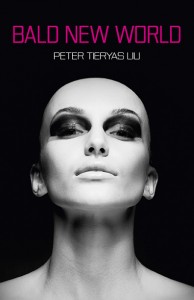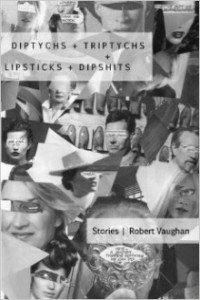Bald New World by Peter Tieryas Liu
 Bald New World
Bald New World
by Peter Tieryas Liu
Perfect Edge, May 2014
229 pages / $16.95 Pre-order from Amazon
Having been thrilled by the imagination in his short story collection, Watering Heaven, I was excited to see Peter Tieryas Liu was taking on a larger work: his new novel Bald New World. The play in the title on the canonical dystopian work by Huxley only further stimulated my appetite.
How would it be handled? Would it be playful? Would it be strange? Would it be dystopian? Yes, yes to all those things (other than the one that isn’t a yes/no question):
As the title suggests, everyone has mysteriously gone bald. One would hope that people would learn to live with baldness, since no one has any hair. However, we should all know human nature better than that by now. Superficial, vain, and capable of endless denial. There are riots, chaos. This goes hand in hand with the actual problems in the world: overpopulation, diminishing food supplies, wars over resources, and so on. Wig companies dominate the global economy.
As one would demand in a dystopian novel, life becomes even more hellish than it already is. Body modification, visits to the United States (though most of the book takes place in China) fraught with the almost certainty of being shot, North Korea kidnapping people from other countries to be slaves in forced labor camps, and more. The term ‘dystopian’ certainly fits.
Within all of this, we have Nick. Nick has spent his life trying to cut himself free from a horribly abusive family…trying to be free. Modernly, he’s a filmmaker:
His friend and employer, Larry, is the heir to the world’s most powerful wig corporation. He’s also somewhat of a fuckup.
However, something particularly strange is going on. Larry may be in over his head, caught up in a conspiracy with far-reaching and possibly deadly consequences. At the heart may be the very secret behind why everyone went bald. Of course, he pulls Nick in. Things wouldn’t be very interesting if he didn’t:
He laughed. “Maybe I’m being a touch melodramatic. Beautiful women always do that to me. Let’s give it one more shot. This new film I was mentioning. It’ll be the biggest ever.”
“Can you give more details?”
“At first, I thought maybe I’d do a documentary about my family. Or maybe I’d make it into a film about a rich family with an idiot son who squandered everything. Would that be too cliché? I don’t want to be that idiot,” he said. “I’m starting to settle on one idea.”
“What is it?”
“I’ve always wanted to do an epic about the Baldification. Maybe call it Bald New World. Do a film about the people in it. It’ll be massive. I guarantee you. This’ll be the film that everyone notices.”
“No one’s figured out what exactly happened yet.”
“That’s what the businesses would like people to think,” Larry said. “What if I told you people like my father knew exactly what happened?
“What do you mean?”
“Well—”
Behind us, one of the factories exploded, blowing the plates off the table and knocking us both back. A second factory blew up, the fire blasting against our faces. My ears were ringing and the smoke made everything hazy. I heard a third boom but couldn’t tell where it was from. Sirens were ringing.
April 4th, 2014 / 11:00 am
Diptychs + Triptychs + Lipsticks + Dipshits by Robert Vaughan
 Diptychs + Triptychs + Lipsticks + Dipshits
Diptychs + Triptychs + Lipsticks + Dipshits
by Robert Vaughan
Deadly Chaps, Dec 2013
60 pages / $9 Buy from Amazon or Deadly Chaps
Diptychs + Triptychs + Lipsticks + Dipshits by Robert Vaughan was a bit of a puzzle for me at first. I’ve read a couple short pieces by Vaughan before, but I’m still fairly new to his work. Those who know him well as a senior flash fiction editor at JMWW or Lost in Thought and/or as the author of the chapbook Microtones (his first full length book, Addicts and Basements, is forthcoming in February 2014) might be slightly more prepared to know what they were holding in their hands. As for me, I just felt my way along and pondered.
I heard some people describe Diptychs + Triptychs + Lipsticks + Dipshits as micro fiction, though others described it as a mixture of micro fiction and poetry. I’m hesitant to go with either description because I just don’t think it’s that clear.
I’m not the most familiar with micros, but if that’s what these are then Vaughan seems to pioneer his own version of the form, if not his own form entirely. Let’s consider “MOVING TO LOS ANGELES: A SCREENPLAY IN THREE ACTS.” In a section labeled “First Act” we are introduced to a character going to L.A. to complete a screenplay about JOE and LIS, “lovers who eat each other, part by part until there is no ‘other’ left.” In the “Second Act,” we find out that JOE is:
Rounding things out, the “Third Act” tells us that “JOE uses the restroom, never returns” and “LIS catches a Cubs pop fly in her gaping mouth,” causing her suffocate. This is a drastic simplification of the piece, but what it shows certainly doesn’t have the same feel or proceed about things in the same way that I’ve seen in the usual micro fiction I know.
For one thing, there is some of the poem about “MOVING TO LOS ANGELES: A SCREENPLAY IN THREE ACTS.” The three acts, the symmetry in the portions and the way they play off each other and morph elements as the piece progresses, bear a great deal of resemblance to sections of a poem. Many of the pieces have a poetic structure, the “Diptychs” and “Triptychs” portion of the title being descriptive of some of the contents though quite a few pieces are neither. By way of example, “COMMON PASSWORD PROFILE USERS: GOD, LOVE, LUST, MONEY AND PRIVATE” has portions that jump off from each of the five most commonly used passwords:
Lust:
What the hell kind of a name is Penfield? She wonders while he takes a leak off the back porch. She leans to se fresh bruises in the dawn’s early light. She rolls too far, ends up on the bamboo-planked floor, giggling. Creepy-crawls under the bed to dial 911 on her mobile phone.
However, though having poetic elements, the works in Diptychs + Triptychs + Lipsticks + Dipshits also don’t exactly remind me that much of most poetry I’ve seen. I’m certainly not a poetry expert by any means. I read somewhere around twenty or thirty books of poetry a year, which I think is more than average but not as much as a serious devotee. Regardless, consider “PART OF LIFE: TWO WAYS.” Sections of this work contrast a child’s view of her dad when her teacher releases a “deformed creature” with that of her mother’s view of the same event. In “Dad” we have: “Part of life, I heard Dad say for the millionth time. Just like mom’s lymphoma.” However, “Mom” relates: “The creature didn’t stir, not a peep. I started to salivate. Would it taste better with cumin or cardamom?” Poem? I’m not sure.
I mean, “Dad” is structured in lines perhaps like a poem, but “Mom” is a solid paragraph. Is it a poem mixing stanzas and prose poetry? Is “Mom” just a single long stanza asymmetrical to the pretty much one-line stanzas of “Dad?” As I mentioned, I’m not a poetry expert. Regardless, it seems to me to have an interesting structure when I look at it as a poem.
To me, it almost seems like Vaughan applies poetic techniques to micro fiction writing, resulting in prose that feels a little more on the fiction side but has a fundamental underlying approach that smacks more of poetry. Still, it isn’t something I can completely pin down. Frankly, the word “Stories” on the cover is really the best description, as each definitely conveys a full story via what seems like brush stoke suggestions (this example from “BLACK & WHITE/COLOR”):
I realize that I’ve spent the vast majority of this review just trying to pin down exactly what Diptychs + Triptychs + Lipsticks + Dipshits is. Perhaps it doesn’t really matter as long as one digs the pieces, which I do. However, when writing is this adventurous in form, I don’t think you can adequately consider it without looking a great deal at the form. I can’t help it; the form of the pieces fascinates.
Personally, I would classify Diptychs + Triptychs + Lipsticks + Dipshits as something that is challenging to define but gratifying to experience. There are certainly leaps and turns that by themselves make the book worth looking at for their wildness. It may not take a long time to sit down and read, but that one sitting is by no means the end of a reader’s engagement. Echoes linger long after the actual sound that caused them is gone.
*****
David S. Atkinson is the author of “Bones Buried in the Dirt and the forthcoming “The Garden of Good and Evil Pancakes” (EAB Publishing, spring 2014). His writing appears in “Bartleby Snopes,” “Grey Sparrow Journal,” “Interrobang?! Magazine,” “Atticus Review,” and others. His writing website is http://davidsatkinsonwriting.com/ and he spends his non-literary time working as a patent attorney in Denver.
January 24th, 2014 / 12:00 pm
